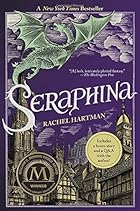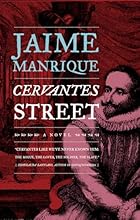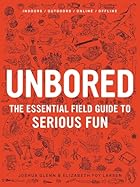This month’s State of the Thing, LibraryThing’s monthly newsletter of features, author interviews and various forms of bookish delight, should have made its way to your inbox by now. You can also read it online. It includes author interviews with David Quammen, Rachel Hartman, Karen Engelmann, and Jaime Manrique, plus some activity ideas from the co-authors of Unbored: The Essential Field Guide to Serious Fun.
 I had the great pleasure of talking to David Quammen about his new book Spillover: Animal Infections and the Next Human Pandemic (W.W. Norton & Company). Some excerpts:
I had the great pleasure of talking to David Quammen about his new book Spillover: Animal Infections and the Next Human Pandemic (W.W. Norton & Company). Some excerpts:
Before we get too far, can you give us the nutshell explanation of zoonosis and spillover, for those who haven’t yet had a chance to read the book? What sorts of diseases are we talking about here?
Zoonosis is an animal infection transmissible to humans. It can be a virus, a bacterium, a protozoan, a number of other infectious bugs. It doesn’t necessarily cause disease in humans, but if it does cause symptoms once it gets into humans, then we call it a zoonotic disease. Spillover is the label for the moment when any sort of an infectious pathogen passes from one species into another, but we particularly think of it in terms of animal infections passing into humans.
That includes a whole rogue’s list of the best-known diseases, and also some little-known things: it includes 60% of the infectious diseases that we know, under the strict definition of zoonosis. That runs from West Nile and hantavirus, Lyme Disease, all the influenzas, Ebola, Marburg, a couple of exotic little-known things called Nipah virus from Bangladesh, and Hendra virus from Australia. Also SARS, which came out of southern China, and of course HIV, the AIDS pandemic, also began with a zoonotic spillover.
Was there a particular author who inspired you as a writer?
There’s one author who influenced me hugely, by far my largest literary influence and it’s probably going to seem counter-intuitive, but that’s William Faulkner. I started as a fiction writer, and before I was a fiction writer I was a fiction reader. I started reading Faulkner when I was a freshman in college, and became obsessed with him (like a lot of people do because he’s such a great writer). I did my graduate work on structure in Faulkner’s novels, and then I started my writing career publishing novels myself. I discovered that I wasn’t really meant to be a novelist and I turned into a non-fiction writer. But even now, when I spend six years or eight years researching a non-fiction subject, a big sprawling topic like zoonotic diseases or island biogeography, and then the time comes to put that together into a 500-page book, or a 600-page book, what I learned from closely, closely examining and pondering the structure of Faulkner’s novels serves me very, very well.
Read the rest of our interview with David Quammen.
 I also had the chance to talk with Rachel Hartman about her first fantasy novel Seraphina (Random House). A few teasers:
I also had the chance to talk with Rachel Hartman about her first fantasy novel Seraphina (Random House). A few teasers:
Your dragons are quite different from those created by other authors; tell us a bit about them, and how you came up with the idea to portray them as you have.
My dragons can take human form, but they rigidly suppress their human emotions, which they find distastefully overwhelming and undragonlike. They’ve been called “scaly Vulcans” by some reviewers: not a perfect analogy, but close enough to give the right idea.
The idea of dragons struggling with being human came to me a few years ago when I learned about a condition called Sensory Processing Disorder. Our brains filter out sensory information so we aren’t overwhelmed by it, and different people’s filters work differently well. It occurred to me that dragons in dragon form would be accustomed to one set of senses: excellent eyesight and smell, indifferent hearing, poor touch and taste. What would it be like to go from those senses to ours, to taste sweetness for the first time or feel with our sensitive skin? From contemplating their senses, it wasn’t much of a stretch to start thinking about emotions. Would dragons in their natural state even have emotions? In my conception, it’s not that they don’t have them at all but that they’re very reflexive and physical. “Fight or flight” is as close as they get to anger and fear, but surely the softer emotions are a messy mammalian thing, for parent-child bonding and social cohesion.
We aren’t born knowing what to do with emotions; I’ve learned this from raising a child. How well are dragons going to be able to cope? They would need some rules for how to keep themselves from being overwhelmed. In my world, they’ve taken a pretty repressive—draconian, even—approach to maintaining their essential dragon-ness. Dragons who “lose” themselves to emotion are sent home and lobotomized. It’s harsh, but they think it’s necessary.
What’s your own library like? What sorts of books would we find on your shelves?
I have a large collection of books on various Medieval subjects: architecture, costume, musical instruments, military history, women’s history, material culture. The jewel of my collection is a three-volume work, The Plan of St. Gall, about a Medieval monastery that was designed but never built. I also have a lot of graphic novels, shelves of classical Greek (which I studied for four years in college), and all my favourite fiction. My husband’s books overlap with mine, so there’s philosophy, science, and many books in Irish.
Read the rest of our interview with Rachel Hartman.
 My third interview for October was with Karen Engelmann. We talked about her really enjoyable debut novel, The Stockholm Octavo (Ecco):
My third interview for October was with Karen Engelmann. We talked about her really enjoyable debut novel, The Stockholm Octavo (Ecco):
Folding fans and the “language of fans” play a key role in the plot. Is this a particular passion of yours? Of all the fans you describe so vividly in the story, do you have a favorite?
My mother gets the credit for inspiring the folding fans. She had a modest collection, but they were magical to me, especially as a child. Much later, I visited an exhibition of rare fans in a museum in Sweden, and was taken by their beauty, mystery and opulence. When I decided to write a novel set in late 18th-century Europe that had female characters in central roles, I knew folding fans would play an important part. Women used every available means at their disposal to survive in the man’s world of the period, and the use of folding fans as a means of communication was an aspect too delicious to ignore. Of the fans in the book, I would want to possess the Chinese Princess, the fan that Mrs. Sparrow throws on the table as a bet in the card game against The Uzanne. The Princess is a child’s fan made of pierced ivory, so she is small and sturdy enough to carry around in my purse, and has a red silk tassel for some added pizzazz.
What was your research process like for the book? You lived in Sweden for a time, right? Any particularly useful sources you’d recommend to your readers?
Living in Sweden for nine years gave me the sensory information, the language skills, and the interest in Swedish history that inspired the novel. The actual research was challenging, since the best material on Gustav and Stockholm is written in Swedish and so required more time and concentration. I have two good friends who provided invaluable help, sending stacks of books (including a Swedish dictionary that must weigh 15 pounds). There is a bibliography on my website for interested readers (both Swedish and English sources) and I would love to see the Swedish volumes translated into English. One cautionary note for writers: the amount of available material can be overwhelming. If you are fascinated by a topic, it can be hard to know when to stop and the story and characters never emerge. Plus, writers want to stuff everything they’ve learned into the narrative and this can kill the story. About 100 pages of my manuscript were cut and most of it was factoids. Listen to your editors!
Read the rest of our interview with Karen Engelmann.
 I was very pleased to be able to chat with Jaime Manrique about his latest novel, Cervantes Street (Akashic Books), a biographical novel about Miguel de Cervantes.
I was very pleased to be able to chat with Jaime Manrique about his latest novel, Cervantes Street (Akashic Books), a biographical novel about Miguel de Cervantes.
Do you recall how the idea for this book originated, or which part came to you first?
One afternoon, about 15 years ago, I was in bed with the flu and in a cable channel I saw a program about Cervantes. Although I had read Don Quixote a couple of times over the years, I knew very little about its author—other than he had lost the use of his left arm fighting in the Battle of Lepanto. When I found out about his captivity in Algiers for five and half years, that later in life he had been in jail twice, that in his 20s he fled Madrid because he wounded a man in a tavern brawl, and the punishment was exile for ten years and the lost of his right hand, I was blown away. It was a life that only a writer of adventure stories could have made up. At that moment, I determined to learn more about this man—about whom little else is known, anyway.
Most folks probably know Cervantes for Don Quixote; tell us about his other works, and which of them would you recommend to contemporary readers?
Unlike Shakespeare who wrote many great plays, Cervantes wrote only one great novel. His other full-length novels are kind of unreadable; his verse is undistinguished. However, the plays that survive are interesting and have splendid moments and beautiful language, and the short ones are marvelous comic inventions. Among the Exemplary Novels are a couple of dazzling jewels. I’m very fond of the Colloquium of the Dogs—which though a bit long-winded is a marvelously unique and inspired short novel.
Read the rest of our interview with Jaime Manrique.
 And last but not least, there’s a neat book out this month from Bloomsbury, Unbored: The Essential Field Guide to Serious Fun. I asked the co-authors, Elizabeth Foy Larsen and Joshua Glenn, to share the activities from the book which their families have enjoyed.
And last but not least, there’s a neat book out this month from Bloomsbury, Unbored: The Essential Field Guide to Serious Fun. I asked the co-authors, Elizabeth Foy Larsen and Joshua Glenn, to share the activities from the book which their families have enjoyed.
Elizabeth recommends:
Yarn bombing: My kids and I used yarn that was sitting in my knitting bag to create a brightly striped rectangle that we turned into a legwarmer for a banister in a particularly grey part of our hometown. To make it even more fun, we waited until it was well past bedtime and dressed up in dark clothes and headlamps to install it. A creative way to add a pop of color to industrial landscapes.
Explode things: Everyone has tried the Diet Coke and Mentos experiment. My kids and I went one step better by chewing a Mento until it was soft enough to cram in the cap of a one liter bottle. Then we put the cap back on, turned the bottle upside down, and threw it onto the street. Then we ran like heck in the other direction while the bottle rocketed more than 25 yards down the street. Watch on YouTube.
Cigar box guitar: A cigar store gave my husband and kids a wooden cigar box with a gorgeous label. They worked together to build a four-string guitar that he uses to play Rolling Stones songs. A challenging but fun activity that is both useful and beautiful to look at. See video of the guitar in action.
And from Josh:
Making LED graffiti: Taking inspiration from the Graffiti Research Lab (a guerrilla street-art outfit), I rounded up a bag of 10mm diffused superbright LEDs, a fistful of 3V lithium batteries, and a stack of disc-shaped rare earth magnets, and handed it all over to my sons and their three girl cousins. They taped these together, thus creating beautiful “glowies” and—even better—”throwies.” Check them out!
Misusing the Foursquare app: The location-based social networking Foursquare is intended for use by 20-somethings interested in friend-finding and nightlife-bragging. But my family enjoys using it to transform our city—and everywhere else—into a game. It’s an app that doesn’t just ask you to stare at a screen; instead, it encourages you to discover new places … some hiding in plain sight.
See more videos and photos from Unbored at www.unbored.net, or download a PDF of these selected activities. Thanks to Elizabeth and Josh for sharing some of their favorite ideas from the book!
Catch up on previous State of the Thing newsletters.
If you don’t get State of the Thing, you can add it in your email preferences. You also have to have an email address listed.












 LibraryThing is hiring again—a relatively junior full-time position, with room to grow. We’re looking for someone smart and organized to help out with the customer support side of
LibraryThing is hiring again—a relatively junior full-time position, with room to grow. We’re looking for someone smart and organized to help out with the customer support side of 






 Publishers do things country-by-country. This month we have publishers who can send books to the US, Canada, the UK, Israel, and more. Make sure to check the flags by each book to see if it can be sent to your country.
Publishers do things country-by-country. This month we have publishers who can send books to the US, Canada, the UK, Israel, and more. Make sure to check the flags by each book to see if it can be sent to your country.























































































